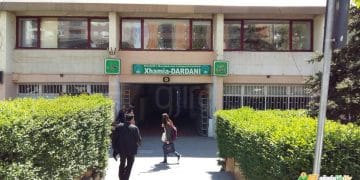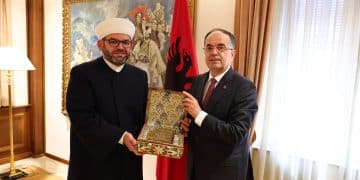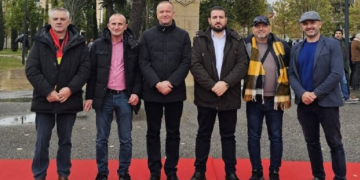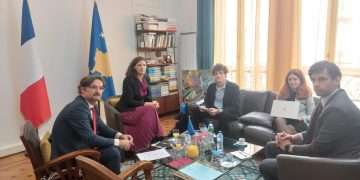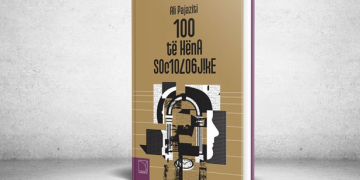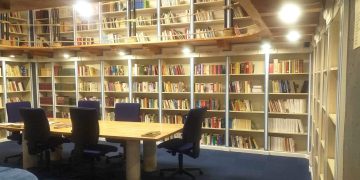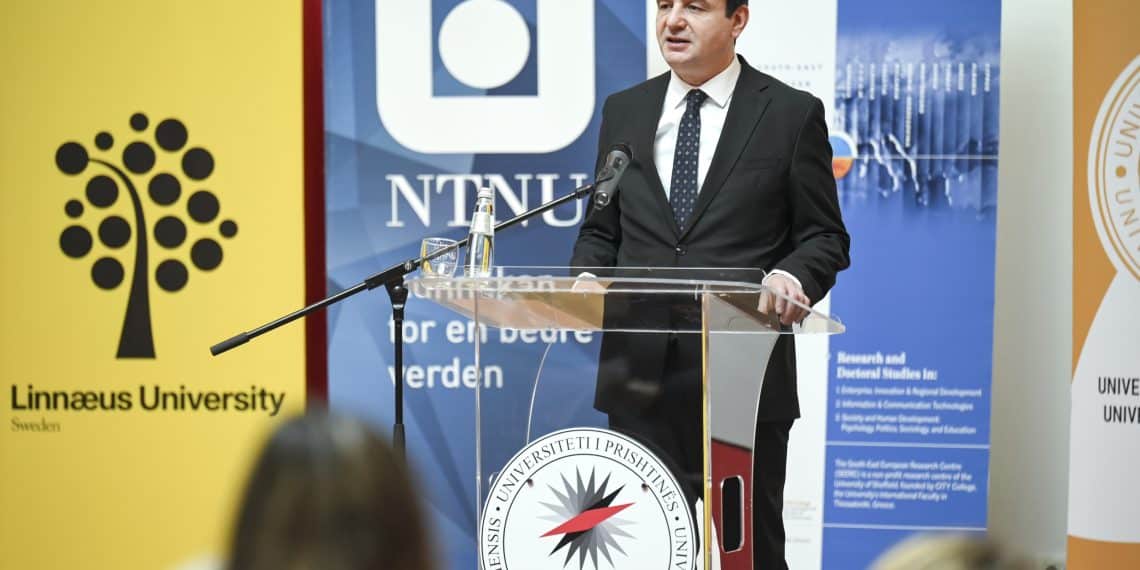Sot u inaugurua Shkolla Kombëtare e Kërkimit në Teknologjinë e Informacionit dhe Komunikimit në Kosovë. Me këtë rast, Kryeministri i Republikës së Kosovës, Albin Kurti, ishte i ftuar si një nga folësit kryesor në këtë ceremoni.
Në fjalën e tij kryeministri Kurti tha se dixhitalizimi padiskutim po formëson të tashmen dhe të ardhmen tonë dhe se roli dhe potenciali i tij nuk mund të kontestohen në vitin 2023.
Ai shprehu përkushtimin e Qeverisë në përdorimin e teknologjisë për të rritur transparencën dhe llogaridhënien në qeverisje, për të përmirësuar shërbimet për qytetarët dhe bizneset tona dhe për të rritur produktivitetin dhe konkurrencën e ekonomisë sonë.
“Teknologjia e Informacionit dhe Komunikimit në vendin tonë ka një potencial të madh. Këtë muaj do të arrijmë mbulimin e plotë të zonave të banuara me infrastrukturë të internetit broadband. Me një industri dhe komunitet të gjallë, TIK-u është një nga sektorët e paktë ku kemi një bilanc pozitiv tregtar. Pra, nuk është befasi që procesi i vazhdueshëm i vlerësimit të Strategjisë së Specializimit të Zgjuar e ka identifikuar tashmë TIK-un si një nga pesë sektorët prioritarë në ekonominë tonë që kanë potencialin më të lartë për rritje dhe inovacion’’, u shpreh kryeministri.
Në bashkëpunim me qeverinë gjermane, Qeveria e Kosovës, theksoi kryeministri, vazhdon të investojë në Parkun e Inovacionit dhe Trajnimit në Prizren – si një nga platformat kyçe brenda ekosistemit tonë kombëtar të inovacionit. Ai bëri të ditur po ashtu se së shpejti do të inaugurohet Parku i Teknologjisë Dixhitale në Bërnicë, që patjetër ofron edhe një platformë që do të sigurojë infrastrukturën për zhvillimin dhe rritjen e industrisë së TIK-ut.
Shkolla Kombëtare e Kërkimeve, sipas kryeministrit, është një bllok i rëndësishëm ndërtimi i progresit që synojmë të krijojmë dhe se programi do të ndihmojë në zhvillimin e ideve inovative që kanë potencial për të krijuar produkte, biznese dhe vende pune të reja dhe për këtë arsye do ta udhëheqin këtë vend drejt hapave transformues.
Duke folur për projektin, ai vendosi theksin edhe te një aspekt i rëndësishëm i tij, e që është përfshirja e diasporës sonë akademike, e cila në radhët e saj ka shumë profesionistë, hulumtues, akademikë dhe ndërmarrës. Andaj, na duhet ta zhbllokojmë potencialin e bashkëpunimin duke krijuar mundësi për diasporën tonë që të sjellë në Kosovë dijen, ekspertizën dhe përvojën e tyre në fusha të ndryshme, shtoi kryeministri.
Në fund, Kryeministri përgëzoi Universitetet partnere për këtë projekt të shkëlqyer dhe u uroi suksese në zbatimin e tij.
Fjala e plotë në gjuhën angleze e Kryeministrit të Republikës së Kosovës, Albin Kurti:
Dear Rector of the University of Prishtina, Qerim Qerimi,
Honorable Norwegian Ambassador, Dear Jens,
Honorable Representative of Swedish Embassy, Dear Katja,
Dear Deputy-Minister of Ministry of Education, Science, Technology and Innovation, Edona Maloku Bërdynaj,
Dear Deputy Minister of Ministry of Foreign Affairs and Diaspora, Liza Gashi,
Dear Pro-rectors of University of Prishtina, Llulaku and Avidija
Dead Deans, Vehapi and Shabani
Honorable Greek Liaison office, Heleni Vakali
Dear project partners, honorable rectors, professors and academics,
It is a pleasure for me to participate in the inauguration of the National Research School in ICT in Kosova. So good morning to you all and congratulations to everyone.
Digitalization is indisputably shaping both our present and future, its role and potential cannot be contested in 2023. As such digitalization is a crucial factor for national reforms and promoting economic growth, social development, and good governance. We are therefore committed to using technology to increase transparency and accountability in governance, to improve services for our citizens and businesses, and to increase our economy’s productivity and competitiveness. The data backs our commitment as a government. Last year, the number of electronic services reached 130, while in the GTMI index of the World Bank, we rose from group C to group B for the focus on digital governance.
Information and Communication Technology in our country holds great potential. This month we will achieve full coverage of residential areas with broadband internet infrastructure. With a vibrant industry and community, ICT is one of the few sectors where we have a positive trade balance. So, it comes as no surprise, that the ongoing Smart Specialization Strategy assessment process has already identified ICT as one of the five priority sectors in our economy that have the highest potential for growth and innovation.
However, unleashing this potential requires a steady supply of skilled ICT professionals. There are 10 universities and colleges in Kosova that provide studies in computer science and computer engineering. The government and our development partners are currently engaged in the training of more than 3,500 young people in various areas of ICT. The private sector is also delivering ICT training programs that aim to prepare young Kosovars for the ICT job market. However, the demand for qualified ICT professionals is much higher than the available supply, and this poses a key challenge for the sustainable growth of the sector.
The sustainable growth of the ICT sector also requires an innovation ecosystem which will provide the infrastructure and the needed linkages between education, research, innovation and entrepreneurship. Our government has been engaged in several initiatives that aim to increase the research and innovation capacities in our country.
In cooperation with the German government, we are continuing to invest in the Innovation and Training Park in Prizren – as one of the key platforms within our national innovation ecosystem. We will soon be inaugurating the Digital Technology Park in Bërnica, at the suburb of Prishtina, and this represents another platform that will provide the infrastructure for the development and growth of the ICT industry.
About a year ago, we became a member of Horizon Europe. We recently completed negotiations for joining another important EU program, namely Digital Europe. Membership in these programs provides additional opportunities for our government institutions, private companies and researchers to apply for research projects funded by these programs.
At the end of last year, we inaugurated the Kosova Research and Education Network (KREN). KREN offers Higher Education Institutions in Kosova access to infrastructure, platforms, software and modern literature, as well as opportunities for national and international cooperation and knowledge exchange. Through implementation of KREN, Kosova has also joined the largest pan-European academic network GÉANT.
We are currently piloting The Kosova Research Information System (KRIS), a project which will support research through an interconnected infrastructure, increased funding and local and international collaboration in scientific projects.
Dear Participants, professors, students, researchers,
The National Research School that we are inaugurating today is an important building block of the progress we aim to create. The program will help develop innovative ideas that have the potential to create new products, businesses, and jobs and therefore lead this country to make transformational strides. And seek to do this as fast and as soon as possible. This project brings a much-needed cooperation between prestigious European universities and our national ones. It also brings us a step further in creating an innovation ecosystem where ideas can be born and built.
And, last but not least, I would like to emphasize another key aspect of this project – the involvement of our academic diaspora. Every third citizen of Kosova is not resident in Kosova. Remittances from our diaspora amount to 20% of GDP. So there is a lot of hard work and a lot of ideas from our diaspora that we plan to bring back and perhaps manage to reverse brain drain into brain gain.
There is no doubt that diaspora is the key contributor to Kosova’s economy. This impact can be greater and more innovative with structures, such as this project, put in place. The Kosovar diaspora has a lot of professionals, researchers, academics, and entrepreneurs. We need to unlock this collaborative potential by creating opportunities for our diaspora to bring back to Kosova their knowledge, expertise and experience in various fields. This project of developing the PhD program in ICT is a great example of how this brain-gain can be achieved.
I would like to congratulate the partner Universities for this excellent project, and wish you success in its implementation./FolDrejt/


